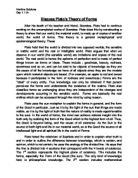Plato however, would argue that we do not need experience to have knowledge, as we have an understanding, albeit a dim one, of everything, from when our souls were in the realm of the forms, and that we can remember everything from that time, through reason.
An empiricist would however argue that although Plato says we already know these things, we have to “remember” them through sensory experience, and that, we could not, for example, be kept in isolation from birth with no education or experience of things outside our prison, and released on our 18th birthday and instantly be able to recognise a horse through the Form we dimly remember. We have to learn these things through our senses, and would not be able to know about, and picture, the horse before our release into the world. We also would have not learned any language through hearing it being spoken around us, making us unable to undergo complex reason in our minds, as I believe complicated logic would be unattainable with no language to think in.
They would therefore argue that Plato must place more value upon the senses, as without them, reason is impossible.
One common argument to suggest that Plato should place more value in experience is that, as there is no way to prove the existence of the Forms, we should place more worth in the physical world around us, as we know for sure that at the very least, we have the illusion of a material world, and the illusion of experience. We should therefore, value what we can see around us, more than something which can never be proven to exist.
People who accept this argument would definitely agree with the statement that “Plato does not value experience enough.”
Following on from the argument that Plato himself was affected by his experience of the death of his mentor, some may say that even his philosophies were greatly impacted by what he saw around him, by studying our world he concluded that there must be more to “reality” than what he saw. Without his experiences, he would not have been able to formulate his ideas, and therefore, it seems absurd for him to suggest that knowledge can only be attained through reasoning, and never through the senses, or via a combination of the two.
I feel this argument definitely supports the idea that “Plato does not value experience enough.”
It could however be argued that Plato is right to place no value upon our sensory experiences, as it is not uncommon in the medical world for patients to suffer sensory hallucinations, broadly defined as “Perception in the absence of a stimulus,” hallucinations can occur in many different forms. Paranoid Schizophrenics for example, may hear voices, migraine sufferers may see flashing lights, epileptics may smell unpleasant things which are not present, and cocaine users may feel bugs crawling on their skin. Plato would tell us that nobody can prove that we are not all hallucinating, and therefore, any value placed upon our experiences, is too much value, and that the only thing we can be sure about, is that flawless logic is the only path to true knowledge.
Through his philosophy, Plato seems to be suggesting that only those who have an understanding of the Form of the Good can lead a moral life. However, many would say that it is absurd to suggest that those who have no knowledge of, or belief in, the Forms, cannot be moral or good people.
I would agree that it is possible to be a moral and good person purely through knowledge of the physical world, and experience of it, and would strongly dismiss Plato's claims to the contrary, that only philosophers can lead a moral existence.
I feel that he does not place enough value in experience and its importance in making people moral, as to me, it sounds ridiculous that someone who has not studied Plato's works cannot lead a good life.
Plato may argue that there are many instances within the physical world where our senses cannot be trusted, even without illness or damage to our sensory organs. For example, refraction of light makes a stick half submerged in water, appear bent, and optical illusions can convince us that something is moving, when, in reality, it is motionless. He, and other rationalists, would therefore argue that he does not place too little value in experiences.
Empiricists however, would counter this by saying that although the stick in water would trick the eye into thinking it was bent, our sense of touch could confirm that the stick was indeed straight. Therefore, even if a sense is tricked, we can always rely on the others to confirm that what it is telling us is false, and so, that our senses as a collective, will always tell us the truth about what we are seeing around us. An empiricist would always agree that Plato does not place enough value on sensory experiences.
Further to this argument, Empiricists may state that, through human history, senses have been wrong far less times than reasoning has. For example, without the sensory experience to back up their logic, people used to believe that the world was flat or dome-shaped. This “logic” actually conflicted with the evidence collected by people almost 3000 years previously, using astronomy, and their knowledge, (again through sensory evidence,) that the moon is spherical.
An Empiricist would argue that although the senses can be tricked occasionally, they are never tricked as a collective, and they are far more reliable than reason ever could be when unsupported by evidence. They would therefore strongly agree with the statement that Plato does not place enough value on experience.
In conclusion, I would agree that Plato does not place enough value on experience, as without it, logic would either be impossible, or meaningless.
I also feel that an analysis of Plato's life is enough to prove the importance of experience. He was due to undertake in a life of politics before the death of his mentor, Socrates, but this sensory experience led him to his “discovery” of the Forms.







